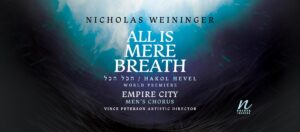
CD Review: Navona Records’ ‘All is Mere Breath’
By Bob Dieschburg“Havel havalim, hakol hevel” from Kohelet 1:2 is commonly translated as “Vanity of vanities, all is vanity,” or equally pessimistic, “All is futile.” Yet “hevel” can also mean “vapor” or “mist,” and by extension “breath.” It dons an existential facet which blends with the divine or, in other words, the life force which God instills in Creation.
To Nicholas Weininger the line means both: a memento mori and a celebration of life in all its frailty and transcendence. “All is Mere Breath” is the result of this meditation on the human condition, a cantata in nine movements which also sees itself as an homage to the victims of the COVID-19 pandemic.
From the Hebraic Bible to the 21st century
“All is Mere Breath” was recorded in the wake of two live performances at Brooklyn’s Church of the Ascension in March 2023. The church acoustics are captured in their fullest and provide an appropriate backdrop to the solemnity of the vetero-testamentary libretto.
The latter spans the Books of Lamentations, Kohelet, Ezekiel, Jeremiah, Psalms, Isaiah, and Joel. The choir, here the Empire City Men’s Chorus, sings the verses in Hebrew and is seconded by the soloists singing in the English translation of American hebraist Robert Alter.
The music itself resonates with the archaic sentiment of the text; yet it also harks back to musical ancestors like the Gregorian plainchant. Its sources of inspiration are indeed manifold: Who currently writes even believes to discern some elements of minimalism which give it an uncannily modern flavor.
After all, Nicholas Weininger is not your usual composer: with a background in mathematics and software engineering he took up private composition studies only in 2014. His career may look unorthodox; but “All is Mere Breath” is no less a labor of love which is steeped both in tradition and a 21st-century sense of modernity pervading the overall texture of its tonal fabric.
“All is Mere Breath” – and Voice!
The forces behind Navona Records benefit from the experience of its three soloists Amy Buckley, Blythe Gaissert, and Brian Mextorf. Gaissert in particular infuses the lines with a tantalizing chiaroscuro which seamlessly dialogues with the gravity of the men’s chorus. Her voice also blends well with the timbral color of soprano Amy Buckley who has been active mostly in the lighter repertory of Mozart, operettas, and even musicals.
Finally, Brian Mextorf delivers a memorable performance, straightforward and free of overly emphasized pathos. His rendition of Joel 1:3 (“Recount it to your children / and to your children’s children / and to their children in a generation to come”) rings as a stark warning against forgetting both the victims of the pandemic and the brittleness of human life as a whole.
Ultimately, “All is Mere Breath” is a gripping, if slightly one sided meditation on mortality which resolves in the otherworldly promise of “the One who makes peace in the heavens.” Weininger ends on this eschatological note which aligns the piece with its liturgical predecessors.
Yet its relative brevity of only 45 minutes also underscores the prevailing aesthetics of “All is Mere Breath” which, in fine, revolve around the interpretation of “hevel” – as “vapor,” “mist,” or “breath” which all have in common the irrefutable sense of something transient but no less beautiful.


